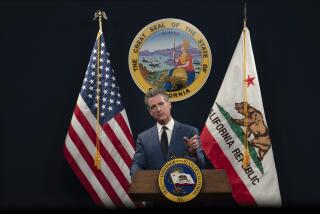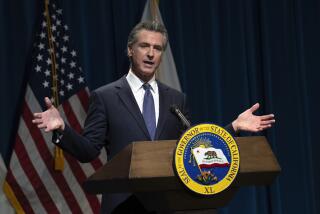Tax Increase May Be Needed to Cut U.S. Budget Deficit, Cranston Says
- Share via
California Sen. Alan Cranston said Friday that the federal deficit has become such a severe problem that it will probably be necessary to raise taxes.
In a breakfast interview with political reporters in Los Angeles, Cranston also said he does not think it would be wise to lower income tax rates at this time. Lowering the rates is a strong selling point of both Democratic and Republican tax reform proposals being considered by Congress.
Cranston, who will seek a fourth term in 1986, acknowledged that talking about tax increases is dangerous for someone about to face the voters again. The Democrat said, however, “I don’t think it is intellectually honest to indicate that I have any great conviction that we can deal with the deficit without a tax increase. But when it will come and under what circumstances relates to the various caveats that I have stated.” Those caveats, mentioned earlier in the interview, are that military spending must be cut; that there must be bipartisan support for a tax increase, including support from President Reagan; and that some kind of tax reform to close loopholes must be enacted. Only then, Cranston said, would he go along with a plan to increase taxes.
‘There Are Other Ways’
Cranston also said: “I do not advocate an increase in the personal income tax or an increase in the basic business or corporate taxes. There are other ways to get there. One is by closing some of the loopholes, second is a very minimum tax on individuals and corporations that ensures that no longer do some corporations and some individuals pay no taxes at all. . . .
“You can raise as much as $20 billion if it (a minimum tax) is done properly. I’m not talking about an increase in tax rates. . . . I’m talking about a minimum tax that ensures that no matter what loopholes you manage to get through, still you are going to have to pay a percentage of your income to the federal income.
“The President says he would oppose an increase in the rates. So would I. He also says he would oppose a reform--whether a minimum tax or reform or anything--that would cause more revenues to be collected than are now being collected. He opposes both. I oppose only one. . . .
“Another plan is a business transfer tax, which people in the Silicon Valley advocate. It is a tax on imports solely to cover the gap in American business competing with foreign businesses, where we have to (contribute to) Social Security and unemployment compensation and they don’t. That could produce as much as $20 billion. That’s a good idea and is not a tax on any American taxpayer.”
‘Very Difficult’
Talking at another point about the deficit, Cranston said: “Another problem is that all of the tax reform proposals call for sizable cuts in the tax rates, including the very top. I’d like to see the rates lowered, but I think it would be very difficult to do it given the deficit. To make cuts in the rates at a time when we have a big deficit does not seem to be very wise.”
On another issue, Cranston said he does not expect any arms-control breakthroughs at Reagan’s summit meeting with Soviet leader Mikhail Gorbachev next month.
“I don’t see what the Soviets can propose if we continue to insist on developing SDI,” Cranston said, referring to Reagan’s Strategic Defense Initiative, which seeks to develop a space shield against nuclear attack. Cranston approves of research for the initiative but said he does not believe that the concept will work and is opposed to its deployment.
Cranston said the issues his campaign will stress next year are “in part the economy, the environment, peace and my effectiveness.”
More to Read
Get the L.A. Times Politics newsletter
Deeply reported insights into legislation, politics and policy from Sacramento, Washington and beyond. In your inbox twice per week.
You may occasionally receive promotional content from the Los Angeles Times.










